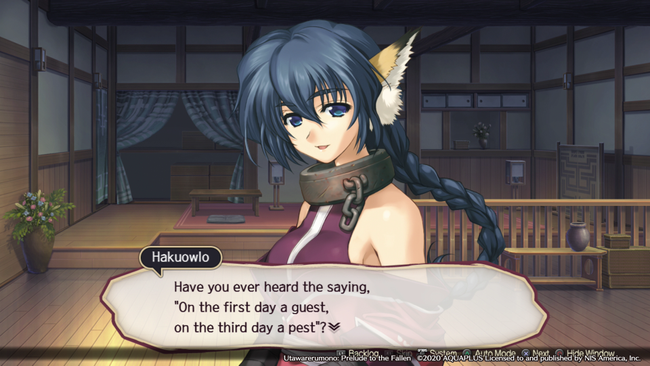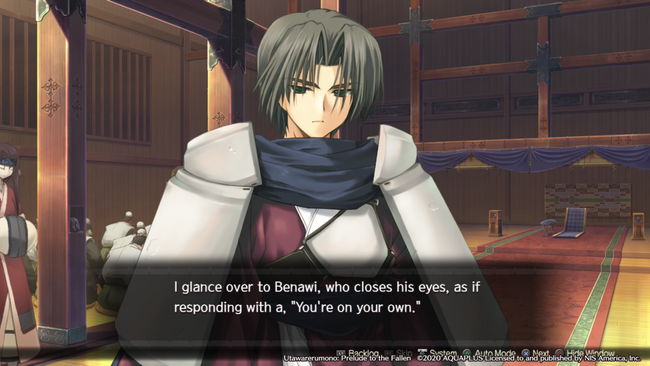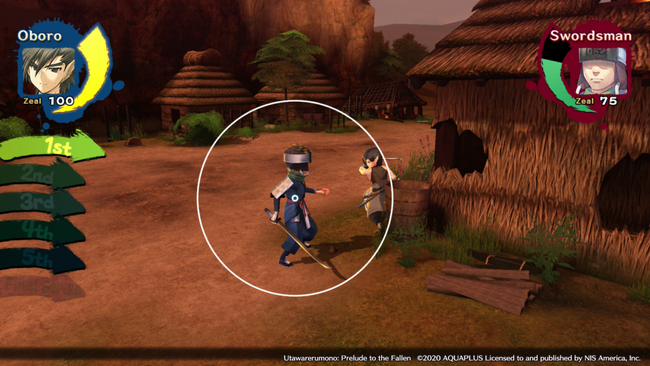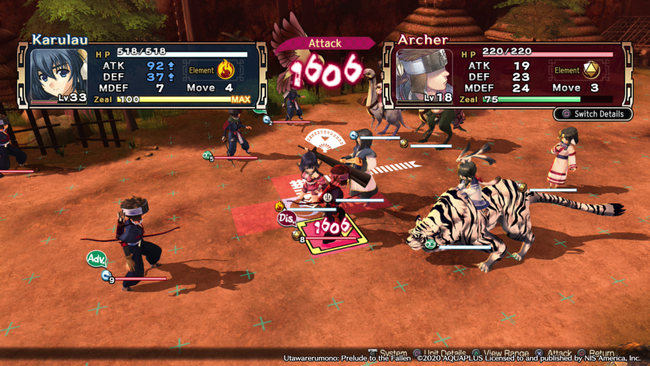Utawarerumono: Prelude to the Fallen Review
Going into Utawarerumono: Prelude to the Fallen, I was worried.
When I played Utawarerumono: Mask of Deception and Mask of Truth last year, I was blindsided by just how much the games ended up enthralling me. Although I started playing them while I was in the middle of a Visual Novel binge, by the end of Mask of Truth, I was just as much in it for the Tactical RPG gameplay as I was in it for the story. Mechanics like Attack Chains and Zeal/Overzeal elevated the battle system and helped accentuate what was already an engaging RPG, and a fascinating story about war, nations, and the allegiances that bind them.
Now, before I played through Mask of Deception and Mask of Truth, I did have one problem - the same problem that many potential Utawarerumono fans have had to deal with for the past 3 years. Although you can enjoy Mask of Deception well enough as your first entry in the series, the story is very much a trilogy - and Mask of Truth heavily relies on knowledge of the first game and its narrative. That being the case, fans had three options - to either play a fan translation of the 2002 PC original that very much read like a fan translation of the era, watch the 26 episode anime adaptation of the first game, or to just go into the series blind and risk confusing yourself. While the anime was a good enough adaptation of the first game's story, the situation was nevertheless anything but ideal. So, when Prelude to the Fallen - a remake of the very first game - finally got announced, I was glad that there would finally be a more elegant solution for players getting into the series... but at the same time, I was more than a little scared.

When Utawarerumono: Mask of Deception and Mask of Truth were released by Atlus West back in 2017, they set a new standard for localizations - shining a light on the excellent worldbuilding and character-driven stories that the series is all about. Needless to say, when it was revealed that NIS America, not Atlus West, would be helming the localization efforts for the new remake of the original title, I wasn't sure what to expect. Any change like this will inevitably mean at least some difference in localization style, and while they've done much better in recent years - with games like Labyrinth of Refrain and The Legend of Heroes: Trails of Cold Steel III receiving excellent translations - I must admit that I wasn't entirely unconvinced if those titles might've been exceptions, rather than a sign of true structural change. I'd be fine with a difference in translation, what I was worried about was a situation similar to Ys VIII: Lacrimosa of Dana's infamous initial translation.
Maybe that sounds harsh, and I'm sure it is, but it's all the more that I can confidently say that NISA has delivered with Utawarerumono's translation.
Of course, conveying the localization quality of a 30+ hour Visual Novel/TRPG hybrid is difficult within the confines of any review, let alone a text-based one. Suffice it to say, the translation flows well, doesn't just stiffly translate lines, and above all maintains the tone of the original Japanese. By any metric it's a good translation, even if it may not reach the same heights as those of the previously released sequels.

With that, let's talk about the actual game. Utawarerumono: Prelude to the Fallen faithfully remakes the original Utawarerumono, and brings it closer in line to the sequels. Battles now take place with the same sort of 3D models as the later games, artwork for the VN sections of the game have been given a resolution boost, and there have been some small tweaks made to the battle system. As for content - the game doesn't include anything explicitly new, but does come with the additional story arc that was added with the PlayStation2 and PlayStation Portable versions of the original game. Despite the facelift, both enemy placements and map design for battles are more or less identical to the original PC release - and if it weren't for the entirely redone visuals for those sections, you'd be forgiven for calling the game something more akin to a remaster than a proper remake.
I enjoyed my time with this remake, but I do have to question some of the decisions that went into what changed and what has stayed the same mechanically, here. Prelude to the Fallen's version of the chain attack system is dramatically different from Mask of Deception and Mask of Truth's, for example. In those games, players could time their button presses during combos to increase the damage of attacks, as well as to increase the amount of Zeal that a unit would gain from each attack. To make matters more interesting, attack chains themselves were littered with "hidden" points where you can tap the attack button in order to deal even more damage, and gather even more Zeal. Characters could have multiple attack chains depending on the situation, with different attributes to them, such as specific attacks in each chain dealing damage to an area of enemies, and more. These chains, in turn, were balanced with the idea that you wouldn't always be using your full chain - sometimes specific attacks in a chain would expend more Zeal than you could gain from landing them, and it would become a sort of give-and-take about when you execute certain parts of your chain, and when to let a chain finish early.

In those games, the glue that held this all together would be "Overzeal", a sort of powered-up state that characters and enemies could reach upon hitting 100 Zeal. Characters would be buffed, gain access to specific abilities like Final Strikes, and more. This system is entirely absent in Prelude to the Fallen.
While Prelude to the Fallen does include a Chain Attack system, and players can time their button presses to receive some benefit in combat, the extent in which players are incentivized to interact with the system is much smaller. Prelude to the Fallen adds both Final Strikes and Co-op Chains to the original formula, which does help speed up combat, but in my opinion, this still doesn't do enough to make combat nearly as engaging as the sequels. Players, of course, won't notice this if they start with Prelude, and the combat is still very faithful to the original release - but to a fault. Timing your button presses grants you more Zeal towards Final Strikes and Co-op chains, but nothing else. There are no hidden points during attack chains where you might have a chance to gain more zeal - and near the end of the game, I found myself wanting to speed through combat, rather than savoring it as I had done in the sequels. It's not a bad TRPG, as there is some strategy based around attacking enemies from the back or side to deal increased damage, and base unit elemental strengths and weaknesses - but it's harder to bill these segments as a major reason to play the game, unlike the others in the series. It's not nearly as unique or engaging.

Thankfully, the other reason that players would have to play Utawarerumono - the story - is as good as it ever was, though I still may be partial to the cast of characters from the sequels. Nonetheless, it's an engaging story in its own right, and it's incredibly relieving to know that there's now a viable method for anyone to play the series in narrative order. It also stands on its own merits entirely better than Mask of Deception, which in hindsight feels like little more than a prologue for the story in Mask of Truth. In comparison, Prelude is a much more balanced story, with better pacing and more consistent story beats with an emotional payoff. Some of the story beats in Prelude hit me like a truck, despite knowing what was coming. One thing that the sequels had nailed was a balance between more relaxed, slice-of-life moments of the story - tempered by the brutal and devastating realities of war. That same balance clearly has always been a part of the series' identity, as can be seen here - though to talk more about any specifics would be to veer into spoiler territory.
It's certainly not the deepest Tactical RPG that I've played, nor the absolute best Visual Novel that I've read, but Utawarerumono: Prelude to the Fallen brings more than enough to the table to be worthy of your time. It may have taken entirely too long for the entire series to make its way over, but I'm glad that it has - and that more and more players will have the chance to start it. Utawarerumono is a great, charming series, and one that is more than deserving of a closer look. This remake might not stand the test of time quite as much as its sequels, but don't let that stop you from getting into the series - it's one that I can't recommend enough.